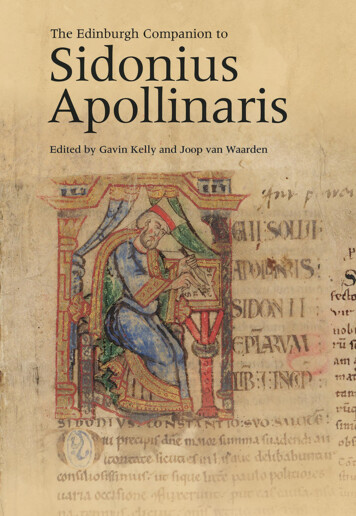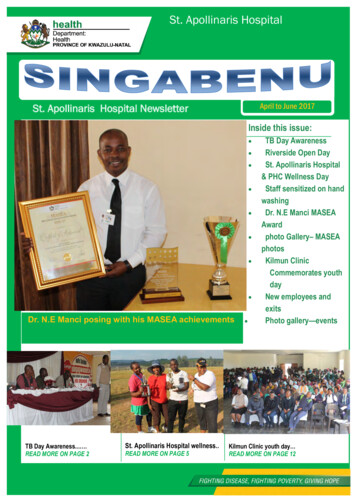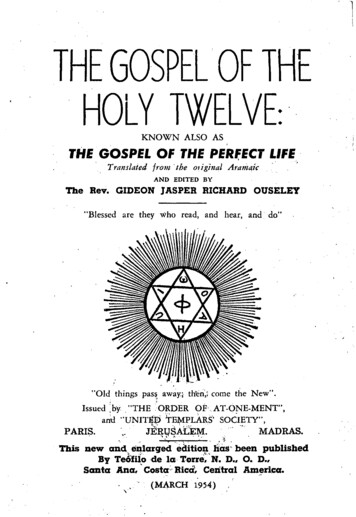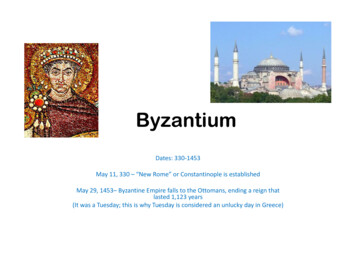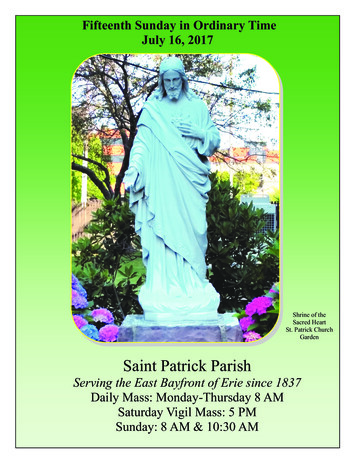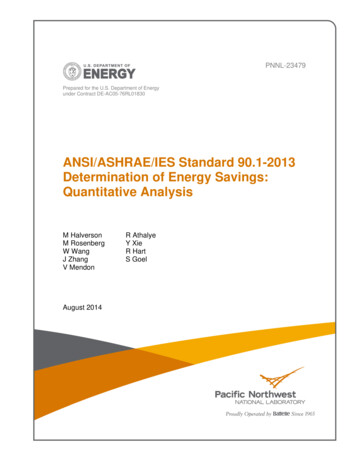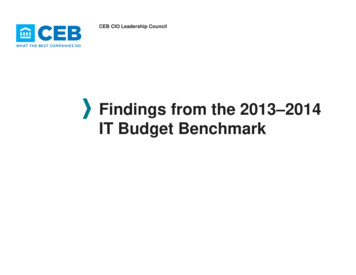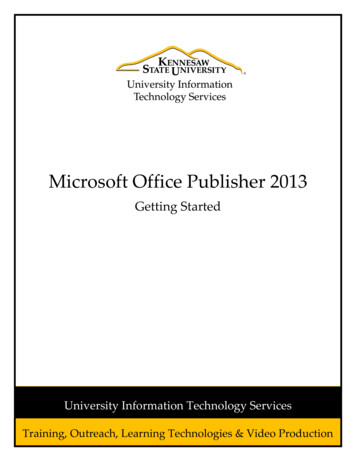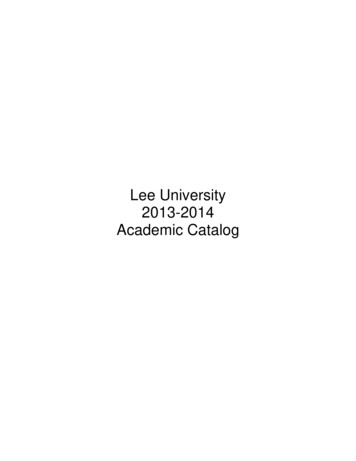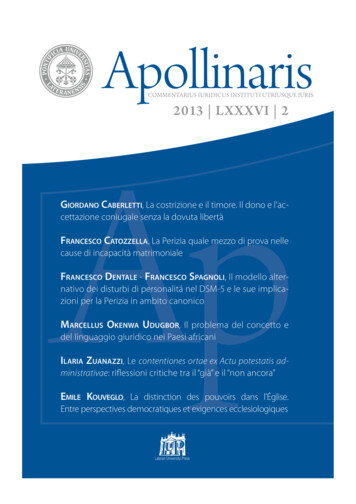
Transcription
2013 LXXXVI 2Apollinaris 2-2013 IIbozza3.indd 29725-08-2014 17:03:08
INDEXII. StudiaGIORDANO CABERLETTI /D FRVWUL]LRQH H LO WLPRUH ,O GRQR H O¶DFFHWWD]LRQH FRQLXJDOH VHQ]D OD GRYXWD OLEHUWj FRANCESCO CATOZZELLA, /D 3HUL]LD TXDOH PH]]R GL SURYD QHOOH FDXVH GL LQFDSDFLWj PDWULPRQLDOH III. ArgumentaPIER VIRGINIO AIMONE ,O VHFRQGR LQWHUYHQWR GL %HQHGHWWR ;9, VXOOH PRGDOLWj SURFHGXUDOL GL HOH]LRQH GHO URPDQR 3RQWH¿FH %UHYL QRWH CRISTIAN BEGUS &RQFHWWL OLQJXDJJLR H 'LULWWR FDQRQLFR XQ ODboratorio sempre apertoFRANCESCO DENTALE - FRANCESCO SPAGNOLI, Il modello alternaWLYR GHL GLVWXUEL GL SHUVRQDOLWi QHO '60 H OH VXH LPSOLFD]LRQL SHU OD 3HUL]LD LQ DPELWR FDQRQLFR GIORGIO FELICIANI, ,O 'LULWWR SXEEOLFR HFFOHVLDVWLFR QHOO¶DWWXDOH 0DJLVWHUR SRQWL¿FLR PAOLO GHERRI %LODQFLR FDQRQLVWLFR GHOOD 6HWWLPD *LRUQDWD FDnonistica interdisciplinareGENNARO TAIANI /D QXRYD /HJJH )RQGDPHQWDOH XQJKHUHVH MARCELLUS OKENWA UDUGBOR, Il problema del concetto e delOLQJXDJJLR JLXULGLFR QHL 3DHVL DIULFDQL ILARIA ZUANAZZI /H FRQWHQWLRQHV RUW H[ FWX SRWHVWDWLV DGPL QLVWUDWLY ULÀHVVLRQL FULWLFKH WUD LO ³JLj H LO ³QRQ DQFRUD Apollinaris 2-2013 IIbozza3.indd 301 397 445 25-08-2014 17:03:08
IV. ExcerptaÉMILE KOUVEGLO /D GLVWLQFWLRQ GHV SRXYRLUV GDQV O¶eJOLVH (QWUH SHUVSHFWLYHV GHPRFUDWLTXHV HW H[LJHQFHV HFFOHVLRORJLTXHV V. Bibliographica2SHUD UHFRJQLWD 2SHUD HGLWD 2SHUD DFFHSWD )RQWHV KXLXV YROXPLQLV %LEOLRJUDSKLD KXLXV YROXPLQLV VI. IndicesIndex Canonum CIC 1983,QGH[ &DQRQXP &&(2 Index Nominum et Auctorum,QGH[ JHQHUDOLV 669 675 Apollinaris 2-2013 IIbozza3.indd 30225-08-2014 17:03:08
Apollinaris, LXXXVI (2013), 305-351La costrizione e il timore. Il dono e l’accettazione coniugale senza ladovuta libertàGIORDANO CABERLETTIAbstractNell’odierno contesto sociale il timore potrebbe essere considerato un vizio del Consenso ormai obsoleto, ma l’autonomia della persona nelle sue scelte fondamentali èancora insidiata e per questo la Legge ecclesiale la tutela. Anche se il Consenso matrimoniale è sempre un atto interno, la causa del difetto di libertà può essere intrinsecao estrinseca. Indubbiamente il Can. 1103, relativo al difetto di libertà per una causaestrinseca al contraente, ha un fondamento nel Diritto naturale ed il Legislatore definisce i requisiti necessari perchè il Consenso non sia valido. In Giurisprudenza, per lamaggior frequenza della fattispecie, occupa parte rilevante il metus reverentialis. LeProve per dimostrare il vizio del Consenso per metus si incentrano sul ruolo coattivodel soggetto che minaccia e sulla condizione passiva di chi subisce la minaccia, chedi conseguenza vede il Matrimonio come mezzo per non incorrere nel pericolo incombente. La Giurisprudenza rotale più recente dimostra che Matrimoni viziati per metus,anche se non hanno più la frequenza dei decenni precedenti, si verificano ancora.Parole chiave:Consenso matrimoniale, libertà, timore, requisiti per efficacia invalidante, Prove.AbstractIn today’s social context, fear as a factor for vitiating consent may be considered asalmost obsolete, but the autonomy of the person in making fundamental choices is stillthreatened and for this reason ecclesiastical Law provides a safeguard. Even thoughmatrimonial Consent is always an inner act of will, the cause for lack of freedom can beintrinsic or extrinsic. Undoubtedly Canon 1103, regarding the contracting party’s lackof freedom as an intrinsic cause, has a basis in natural Law and the Legislator definesthe essential elements for the invalidity of ex metu Consent. In Jurisprudence, themajority of such cases concern metus reverentialis. Evidence to show lack of consentby reason of metus focuses on the coercive role of the subject who threatens and thepassive condition of the one subjected to such threat, the latter seeing Marriage as ameans to avoid the impending danger. The most recent rotal Jurisprudence shows thatMarriages vitiated on account of metus, even though less frequent than in previousdecades, still occur.Keywords:Canon marital Consent, freedom, fear, requisites for effective invalidating factor/requisites for effective invalidity, Evidence.Apollinaris 2-2013 IIbozza3.indd 35125-08-2014 17:03:11
Apollinaris, LXXXVI (2013), 353-386La Perizia quale mezzo di prova nelle Cause di incapacità matrimonialeFRANCESCO CATOZZELLAAbstractL’articolo, dopo aver chiarito la funzione della Perizia nella prova dell’incapacità matrimoniale e mostrato come i due celebri principi («Peritus in arte credendum est» e«Iudex Peritus Peritorum») possano conciliarsi, si sofferma in particolare su due temi:la formulazione dei quesiti da proporre al Perito e la valutazione delle conclusioni peritali. I quesiti devono essere specifici, non solo in riferimento alla singole fattispecienormative del Can. 1095, ma soprattutto in relazione all’unica ed irripetibile biografiapersonale e matrimoniale del periziando. Gli esempi riportati aiutano a comprenderesu quali aspetti concreti bisogna interpellare il Perito. La valutazione della Prova peritale presuppone in primo luogo la verifica del triplice fondamento (antropologico,logico-metodologico e “nei fatti”) su cui essa si basa, in secondo luogo il trasferimentoe la traduzione delle conclusioni peritali nell’ambito canonico. Lo studio delle Sentenzerotali decise nell’anno 2004 permette di verificare in concreto come i principi teoriciesposti siano stati applicati.Parole chiave:Incapacità, Matrimonio, Perizia, Processo, Prova.AbstractThe article, after clarifying the role of the Expert’s Report in the proof of matrimonialincapacity and showing how the two famous principles («Peritus in arte credendumest» and «Iudex Peritus Peritorum») can be reconciled, focuses mainly on two issues:the formulation of the questions to be proposed to the Expert and the assessment ofthe Expert’s Report. The questions must be specific, not only in relation to the individual situations provided by Canon 1095, but especially in relation to the unique andunrepeatable personal and marital biography of the party concerned. The examplesgiven will help to understand on which concrete aspects the Expert needs to be asked.The assessment of the Expert’s Report implies: firstly, the verification of the threefoldfoundation (anthropological, logical-methodological and “on the facts”) on which it isbased; secondly, the transfer and the translation of the conclusions of the Expert withinthe canon Law setting. The study of the Rota Decisions in the year 2004 shows howthe described theoretical principles have been applied in practice.Keywords:Incapacity, Marriage, Expert Report, Process, Evidence, Proof.Apollinaris 2-2013 IIbozza3.indd 38625-08-2014 17:03:14
Apollinaris, LXXXVI (2013), 389-396Il secondo intervento di Benedetto XVI sulle modalità procedurali diElezione del romano Pontefice. Brevi notePIER VIRGINIO AIMONEAbstractA partire dal secondo millennio tre punti essenziali hanno caratterizzato l’Elezione delVescovo di Roma. Il Papa viene eletto dal Collegio dei Cardinali di S.R.C. rinchiusoin Conclave con la maggioranza qualificata (2/3) dei Cardinali elettori presenti in Conclave. Il principio della maggioranza qualificata era di fatto venuto meno a seguito delladisposizione procedurale contenuta nella Costituzione apostolica Universi DominiciGregis di Giovanni Paolo II, ma esso è stato ripristinato immediatamente dopo la suaElezione da Benedetto XVI. La rinuncia al pontificato da parte di Benedetto XVI (rinuncia già prevista dalla Decretale Quoniam Aliqui inserita da Bonifacio VIII nel LiberVI, ma mai fatta valere da alcun Papa a partire da quella inserzione, se si eccettuaquella forzosa del Papa romano nel 1417, durante il grande Scisma di Occidente) hareso necessarie alcune modifiche di carattere secondario contenute nel m.p. NormasNonnullas del 22 febbraio 2013. Di queste modifiche secondarie si rende contro inquesta breve nota.Parole chiave:Elezione papale, Conclave, maggioranza, rinuncia, Cardinali.AbstractSince the second millennium three essential points have determined the Election ofthe Roman Bishop. The Pope is elected in Conclave by the College of H.R.C. Cardinals with the qualified majority (two-thirds) of the electoral Cardinals. The condition ofthe qualified majority was in fact abolished by John Paul II in his apostolic ConstitutionUniversi Dominici Gregis, however it was reintroducted just after his Election by Benedict XVI. The abdication of Pope Benedict XVI has demanded some small changes inthe rules (even if the rule concerning papal abdication was actually introduced in canonLaw in 1298 by Boniface VIII with the Decretal Quoniam Aliqui, it had never been usedby any Pope, if the obligatory climb-down of the roman Pope in 1417 is disregardedduring the great Western schism) has demanded some small changes in the rules(m.p. Normas Nonnullas of february, 22, 2013). This short paper presents these smallchanges in the rules.Keywords:Papal Election, Conclave, majority, renounce, Cardinals.Apollinaris 2-2013 IIbozza3.indd 39625-08-2014 17:03:14
Apollinaris, LXXXVI (2013), 397-413Concetti, linguaggio e Diritto canonico: un laboratorio sempre apertoCRISTIAN BEGUSAbstractLa dottrina svolge una funzione rilevante non solo influenzando il Legislatore che puòpositivizzare indirizzi dottrinali, ma anche agendo direttamente nell’Ordinamento conriflessi sull’interpretazione e sull’applicazione del Diritto. Nell’Ordinamento canonicoi Giudici si formano nelle Università, venendo a contatto con la dottrina, e questostudio porta alla trasposizione di quanto appreso dagli scritti dottrinali nello svolgimento dell’attività giudiziaria.Sia nei casi di difficoltà di specifiche concettualizzazioni, come avviene per la Tassa,sia nei casi di corretto funzionamento del formante dottrinale, come nella concettualizzazione relativa al bonum coniugum, sia nei casi di concettualizzazioni non concluse,come nella valutazione della legittimità della Disposizione data dal Superiore, la dottrina non deve finire in un circolo di autolegittimazione con la proposizione di proprieinterpretazioni vetuste poiché suo compito è proporre concettualizzazioni conformi alConcilio Vaticano II, consentendo la retta comprensione della Legge nonché la valorizzazione dell’opera del Legislatore e proponendosi come formante dell’Ordinamentogiuridico.Parole chiave:Dottrina canonistica, formante dottrinale, bonum coniugum, obbedienza, Tributi canonici.AbstractDoctrine plays an important role not only in influencing the Legislator that can positivise doctrinal lines but also by acting directly within the legal System with consequenteffects on the interpretation and application of Law. In canon Law, the Judges aretrained in the Universities through their coming into contact with doctrine, this studythen leads to the implementation of what has been learned from doctrinal writings inthe conduct of their judicial activity.Both in cases concerning the difficulty of specific conceptualization (as is the case ofTax), and in cases concerning the proper functioning of doctrinal formant (as in theconceptualization of the good of the spouses – bonum coniugum), and in cases ofunconcluded conceptualizations (as in the assessment of the legality of the Provisiongiven by the Superior), the doctrine must not end in a cycle of self-legitimation with theproposition of its own obsolete interpretations since its task is to propose conceptualizations in accordance with Vatican Council Il enabling a correct understanding of theLaw and the promotion of the work of the lawmaker, while presenting itself as a formantof the legal System.Keywords:Canonical doctrine, doctrinal formant, bonum coniugum, obedience, canonical taxation.Apollinaris 2-2013 IIbozza3.indd 41325-08-2014 17:03:15
Apollinaris, LXXXVI (2013), 415-424Il modello alternativo dei disturbi di personalitá nel DSM-5 e le sueimplicazioni per la Perizia in ambito canonicoFRANCESCO DENTALE - FRANCESCO SPAGNOLIAbstractIl presente articolo è finalizzato ad illustrare il modello alternativo ai disturbi di personalità del DSM-5, con una serie di possibili implicazioni per la Perizia in ambitocanonico. Per questo vengono sistematicamente presentati ed argomentati da un latoil sistema diagnostico del DSM-IV-TR con i suoi relativi limiti, e dall’altro i nuovi criteridel DSM-5. In particolare, vengono illustrate e criticamente valutate una serie di nuoveproposte del DSM-5, chiarendo il loro ruolo per il miglioramento di alcuni problemiirrisolti del sistema DSM-IV, ossia l’eccessiva comorbidità delle categorie PD, l’elevataeterogeneità degli individui con la stessa diagnosi PD, l’approccio obsoleto alle sogliediagnostiche, l’instabilità temporale delle diagnosi, il ristretto range di psicopatologiache sembra riuscire a coprire il sistema e la mancanza di un modello teorico, fondatoempiricamente, in grado di suffragare la scelta dei criteri. Infine vengono discussi imiglioramenti che il DSM-5 potrebbe implicare nella valutazione diagnostica in ambitocanonico, specialmente a proposito del collegamento fra etichetta diagnostica e incapacità giuridica.Parole chiave:Perizia canonica, DSM-IV-TR, DSM-5, disturbi della personalità.AbstractThe present paper is aimed at illustrating the alternative model for personality disorders (PD) included in the DSM-5 system, with a series of possible implications for theExpert’s Report in the field of canon Law. In order to do this, there are presented andargued, on one hand, the DSM-IV-TR diagnostic system with its limitations and, on theother, the new DSM-5 criteria. In particular, a series of new proposals, included in thealternative model, were illustrated and critically evaluated, clarifying their role for theimprovement of DSM-IV TR unresolved questions, such as the excessive comorbidityof PD categories, the high heterogeneity of individuals with the same PD diagnosis, theobsolete approach to diagnostic thresholds, the temporal instability of diagnoses, thenarrow range of personality psychopathology considered and the lack of an empiricallyfounded theoretical model able to support the choice of criteria. Finally, improvementsthat the DSM-5 alternative model may involve for the expert’s report in the field ofcanon Law, especially regarding the link between diagnostic label and legal incapacity,are discussed.Keywords:Expert Report in canon Law, DSM-IV-TR, DSM-5, personality disorders.Apollinaris 2-2013 IIbozza3.indd 42425-08-2014 17:03:16
Apollinaris, LXXXVI (2013), 425-443Il Diritto pubblico ecclesiastico nell’attuale Magistero pontificioGIORGIO FELICIANIAbstractLo studio intende offrire i primi risultati di una ricerca diretta a mettere in luce qualerapporto di continuità ed innovazione intercorra tra il tradizionale Ius publicum ecclesiasticum externum e la visione conciliare. In tale intento esso procede ad unacomparazione tra le dottrine tradizionali – in particolare le Institutiones Iuris publici ecclesiastici del Cardinal Ottaviani – e la ricezione del Vaticano II nel Magistero pontificio.L’analisi dei temi della libertà religiosa, della laicità dello Stato e dei Concordati tra laSanta Sede e gli Stati – campi principali dell’indagine – mostra come le interpretazionidi Giovanni Paolo II e Benedetto XVI degli insegnamenti conciliari non costituiscanouna radicale rottura con il passato, ma offrano senza dubbio una concezione rinnovatadelle relazioni della Chiesa con gli Stati. In particolare, Benedetto XVI ricorda, in piùoccasioni, come la Chiesa non voglia rivendicare alcun privilegio nei rapporti con l’Autorità civile, ma intenda adempiere la propria missione nel pieno rispetto della laicitàdello Stato (cfr. Gaudium et Spes, n. 76).Parole chiave:Chiesa cattolica, Diritto pubblico ecclesiastico, Magistero pontificio, libertà religiosa,Concilio Vaticano II.AbstractThis study provides the first results of a research directed at highlighting what kind ofrelationships exist between innovation and continuity in the traditional Ius publicumecclesiasticum externum and the conciliar vision. It draws a comparison between traditional doctrines – particularly Ottaviani’s Institutiones Iuris publici ecclesiastici – andthe implementation of the conciliar texts by the pontifical Magisterium. Analysis of thetopics of religious freedom and the Conventiones between the Holy See and States– main fields of the survey – shows how John Paul II’s and Benedict XVI’s interpretations of the teachings of the Council do not constitute a radical break with the past, butwithout doubt they offer a renewed conception of the Church’s relations with States.Benedict XVI often recalls how the Church does not want to claim any privilege in relations with civil Authorities, but intends to fulfill its mission in full respect of the secularState (cf. Gaudium et Spes, no. 76).Keywords:Catholic Church, ecclesiastical public Law, pontifical Magisterium, religious freedom,Second Vatican Council.Apollinaris 2-2013 IIbozza3.indd 44325-08-2014 17:03:17
Apollinaris, LXXXVI (2013), 445-462Bilancio canonistico della Settima Giornata canonistica interdisciplinarePAOLO GHERRIAbstractLa riflessione giuridica sulla relazione tra parole e concetti ha evidenziato l’importanzadegli elementi e fattori esistenziali e culturali per la comprensione di molte categoriegiuridiche di uso comune.Il significato di molti concetti, che si credeva ormai fissato in modo definitivo, ha cosìpotuto ricevere nuovi apporti fecondi di prospettive.In campo giuridico risultano oggi più evidenti: la co-relatività tra giuridicità e linguaggio;la forte connotazione culturale dello Ius proprium; la strutturale dialogicità dell’ambitogiuridico, la consistenza linguistica e concettuale delle Norme, l’uso dell’analogia, oltreallo stretto rapporto tra Diritto, parola e persona.Si possono anche ri-vedere e ri-formulare utilmente i concetti di Diritto, di Morale, diLegge naturale.Parole chiave:Concetti giuridici, concetto di Diritto, Legge naturale.AbstractThe legal reflection on the relationship between words and concepts have highlightedthe importance of cultural and existential factors for the understanding of many legalcategories in ordinary use.The meanings of many concepts, already believed to be definitively determined, havebeen able to receive new contributions full of fruitful perspectives.In the legal field, these are now more obvious: the co-relativity between legality andlanguage; the strong cultural connotation of the Ius proprium; the dialogic structure ofthe legal framework; the linguistic and conceptual consistency in the Norms; the use ofanalogy, in addition to the close relationship between law, the word and the person.The concepts of Law, Morals, and natural Law can also now be usefully reviewed andreformulated.Keywords:Legal concepts, concept of Law, natural Law.Apollinaris 2-2013 IIbozza3.indd 46225-08-2014 17:03:18
Apollinaris, LXXXVI (2013), 463-486La nuova Legge Fondamentale ungherese.Elementi da una discussione in attoGENNARO TAIANIAbstractLa Costituzione ungherese del 2012 è la prima completamente nata all’interno delsistema comunitario europeo e soggetta alle esigenze fissate nei diversi Trattatidell’Unione. La sua approvazione ha dovuto confrontarsi con istanze sovranazionali deltutto nuove rispetto a quelle pre-comunitarie, evidenziando problematiche di rilievo peril Diritto costituzionale contemporaneo. La forte identità nazionale e la volontà di autodeterminazione e stabilità interna hanno creato problemi politici di forte ricaduta giuridica tanto all’interno che all’esterno, suscitando forti critiche all’operato del Governo.L’articolo offre un quadro riassuntivo della vicenda in chiave costituzionalistica comunitaria.Parole chiave:Costituzione ungherese, Ungheria, Diritto costituzionale, Commissione di Venezia.AbstractThe hungarian Constitution of 2012 is the first to be completely formed in the European Community system and is subject to the requirements established by the variousTreaties of the Union. Its approval had to deal with supranational instances whichwere completely new compared to those existing before entering the Community, andconsequently highlighting relevant issues for contemporary constitutional Law. Strongnational identity and the desire for self-determination and internal stability have created political and legal problems both within and outside the country, prompting strongcriticism of the work of the Government. The article provides a summary of the storyfrom a constitutional community viewpoint.Keywords:Hungarian Constitution, Hungary, constitutional Law, Venice Commission.Apollinaris 2-2013 IIbozza3.indd 48625-08-2014 17:03:19
Apollinaris, LXXXVI (2013), 487-513Il problema del concetto e del linguaggio giuridico nei Paesi africaniMARCELLUS OKENWA UDUGBORAbstractLe influenze coloniali hanno provocato una rivoluzione linguistica nei Paesi africani.Tale rivoluzione ha creato gravi impedimenti ad ogni livello, nello svolgimento delleattività giuridiche nei Paesi africani: dalla legiferazione nei Parlamenti, all’attività digoverno, nonché nei Tribunali dove la lingua processuale è quella coloniale. Questiproblemi sono causati dalla negligenza dello sviluppo delle lingue locali africane edall’importanza predominante spesso concessa a quelle coloniali ormai consideratelingue delle èlites. Anche a livello di codificazione delle Leggi africane, il problemalinguistico rimane un nodo da sciogliere: per rendere comprensibile il significato delDiritto ai cittadini africani, occorrerebbe uno sviluppo linguistico locale a partire dallaformazione di base, dato che la “lingua” è la consolidazione di un’identità culturale diun popolo ed è sopratutto uno strumento per una Legge certa.Parole chiave:Paesi africani, linguaggio giuridico, colonizzazione, lingua ufficiale e nazionale, Processo giudiziario, interpretazione giuridica.AbstractColonial influence has led to a linguistic revolution in african Countries. Such revolutionhas created major obstacles in all african legal activities, ranging from Law making inParliaments, in government activities towards the application of enacted Laws. Similardifficulties are also found in Courts where only colonial languages are used, necessitating the need for interpreters, who, most times, give wrong translation of the depositions of Defendants, plaintiffs, witnesses, lawyer’s interventions, and finally CourtSentences issued by Judges, who received their legal education in the colonial Countries concerned, thus obliging to use such colonial languages for all court verdicts. It isthen important to pinpoint that the problems of legal language are mainly due to: thenegligence in the development of african local languages, and the excessive importance given to colonial languages, considered today as the language of the elites. Inaddition, the problem of codification of african Laws remains a case in point: in orderto let african citizens understand the meaning of Law, there is great need for the development of african local languages, starting from the basic training, since “language”is the consolidation of the cultural identity of a given people, and, above all, a tool forany “good Law”.Keywords:African Countries, legal language, colonization, official and national languages, Courtproceedings, legal interpretation.Apollinaris 2-2013 IIbozza3.indd 51325-08-2014 17:03:21
Apollinaris, LXXXVI (2013), 515-546Le contentiones ortae ex actu potestatis administrativae: riflessionicritiche tra il “già” e il “non ancora”ILARIA ZUANAZZIAbstractIl lavoro ripercorre le fasi della riforma del Diritto amministrativo nella Chiesa cattolica eaffronta alcune questioni concrete di interpretazione e di applicazione della Normativa,sorte in una Causa trattata da alcune pronunce della Rota Romana: l’ambito e i titolaridella funzione amministrativa; la qualificazione degli Atti amministrativi; la giurisdizionee l’oggetto dei Ricorsi amministrativi; la riparazione dei danni.Parole chiave:Diritto amministrativo, Atti amministrativi, Ricorsi amministrativi, riparazione dei danni,tutela dei diritti.AbstractThe article retraces the steps in administrative law reform in the catholic Church anddiscusses some practical issues, concerning the interpretation and application of therules, arisen in a Case dealt with by Judgments of the Roman Rota: the extent to andthe holders of the administrative function; the classification of administrative Acts; jurisdiction and the object of administrative claims; compensation for damage.Keywords:Administrative Law, administrative Acts, administrative Claims, compensation for damage,protection of rights.Apollinaris 2-2013 IIbozza3.indd 54625-08-2014 17:03:23
Apollinaris, LXXXVI (2013), 549-588La distinction des pouvoirs dans l’Église. Entre perspectivesdémocratiques et exigences ecclésiologiquesÉMILE KOUVEGLOAbstractNel dialogo scientifico tra l’Ordinamento canonico e i sistemi giuridici delle democraziecontemporanee, la distinzione dei poteri appare come una problematica che nello stessotempo li accomuna e li distingue. Dopo un accenno storico all’emergere della distinzionenell’Ordinamento canonico, l’articolo si sofferma su due diversità terminologiche: l’usocoerente dei termini “potere” e “funzione”, “esecutivo” e “amministrativo”. L’analisi poi deimeccanismi di attuazione della distinzione nel Diritto della Chiesa rivela delle differenzefondamentali con gli Ordinamenti statali. Se la distinzione può costituire validamenteuna garanzia costituzionale contro l’abuso e l’assolutismo del potere pubblico, le differenze teoretiche e applicative che emergono dal confronto del modello ecclesiale con ilprincipio democratico traducono comunque due Antropologie opposte e due concetti diversi dell’Autorità laddove, l’organizzazione del potere nella Chiesa non può fondarsi sulpresupposto del sospetto a priori nei confronti di ogni Autorità. Tuttavia questo confrontoanalitico suggerisce utilmente uno studio approfondito sull’effettività degli strumenti dimoderazione del potere e di ragionevolezza nell’Ordinamento canonico.Parole chiave:Distinzione dei poteri, potestà, funzioni, amministrativo, esecutivo, democrazia, moderazione del potere.AbstractIn the scientific dialogue between the canon Law Order and the juridical Systems ofcontemporary democracies, the distinction of powers appears as a problem whichmakes them similar and distinct at the same time. After a historical study of the distinction in the canon Law Order, this paper looks at two inner terminological differences,that is the coherent use of the terms: “power” or “function”, “executive” or “administrative”. The analysis of the implementation mechanisms for the distinction in Church Lawreveals some fundamental distinctions with State Orders. If distinguishing the powersmay really constitute a constitutional warranty against abuses and absolutism of publicpower, the theoretical and applicative differences which emerge when comparing theecclesiastical model with the democratic principle nevertheless express two types ofAnthropologies fundamentally opposed and two different conceptions of the Authoritybecause the organization of the power in the Church cannot a priori be founded on anysort of suspicion toward the Authority. However, this way to confront the canon LawOrder with the juridical Systems suggests an in-depth study on the effectiveness of themoderation tools of power and rationality in the canon Law Order.Keywords:Distinction of powers, power, function, administrative, executive, democracy, moderation of power.Apollinaris 2-2013 IIbozza3.indd 58825-08-2014 17:03:26
Apollinaris_2-2013_IIbozza3.indd 396 25-08-2014 17:03:14. Apollinaris, LXXXVI (2013), 397-413 Concetti, linguaggio e Diritto canonico: un laboratorio sempre aperto CRISTIAN BEGUS Abstract La dottrina svolge una funzione rilevante non solo influenzando il Legislatore che può
